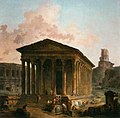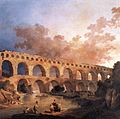Principal Monuments of France
Principal Monuments of France (French: Principaux Monuments de la France) is a series of four paintings created by the French artist Hubert Robert in 1786. They depict the ruins of several Roman structures in Provence.
Series
The paintings were made using oil on canvas. The subjects are ancient Roman ruins in Provence in southern France. The structures depicted are the interior of the Temple of Diana in Nîmes, the Triumphal Arch and Roman Theatre in Orange (combined in an imaginary perspective), the Maison Carrée, amphitheater and Tour Magne in Nîmes (also from an imaginary perspective), and the Pont du Gard over the Gardon river.
-
 Interior of the Temple of Diana in Nîmes (Intérieur du Temple de Diane à Nîmes), 242 × 242 cm
Interior of the Temple of Diana in Nîmes (Intérieur du Temple de Diane à Nîmes), 242 × 242 cm -
 The Arc de Triomphe and the Theater in Orange (L'Arc de triomphe et le Théâtre d'Orange), 242 × 242 cm
The Arc de Triomphe and the Theater in Orange (L'Arc de triomphe et le Théâtre d'Orange), 242 × 242 cm -
 The Maison Carrée, the Amphitheater, and the Tour Magne in Nîmes (La Maison Carrée, les Arènes et la Tour Magne à Nîmes), 243 × 244 cm
The Maison Carrée, the Amphitheater, and the Tour Magne in Nîmes (La Maison Carrée, les Arènes et la Tour Magne à Nîmes), 243 × 244 cm -
 The Pont du Gard (Le Pont du Gard), 242 × 242 cm
The Pont du Gard (Le Pont du Gard), 242 × 242 cm
Background
Hubert Robert (1733–1808) belonged to a trend of 18th-century veduta painters specialized on ancient ruins, established in France through Giovanni Paolo Panini and Claude Joseph Vernet. This trend was greatly supported by the development of archeology, which increased the interest in ancient buildings. Robert had traveled in Italy in 1754–1765 and painted many Roman ruins on location. After returning to France he continued to paint ancient ruins as well as idealized versions of French landscapes.[1]
History

The Principal Monuments of France was made in 1786 to decorate a room at the Palace of Fontainebleau, although the paintings were never installed at this location. In 1787 they were reproduced as engravings. The four paintings were also exhibited at the Salon in 1787. They were bought by the Bâtiments du Roi, but for unknown reasons two of them, The Arc and The Maison Carrée, were returned to the painter. On 13 July 1821 they were bequeathed by Robert's widow to the Louvre.[2] All four paintings are now found in the Department of Paintings in the Louvre.[3][4][5][6]
In 1789, Robert painted The Ruins of Nîmes, Orange and Saint-Rémy-de-Provence, which depicts all ruins seen in the Principal Monuments series.[7]
See also
References
- ^ "Eighteenth-Century Genre Painting" (PDF). Musée Fabre. Retrieved 12 February 2020.
- ^ Cabillot, C. (1895). Hubert Robert et son temps. Paris: Librairie de l'Art. pp. 132–133.
- ^ "Interior of the Temple of Diana in Nîmes". Louvre. Retrieved 12 February 2020.
- ^ "The Arc de Triomphe and the Theater in Orange". Louvre. Retrieved 12 February 2020.
- ^ "The Maison Carrée, the Amphitheater, and the Tour Magne in Nîmes". Louvre. Retrieved 12 February 2020.
- ^ "The Pont du Gard". Louvre. Retrieved 12 February 2020.
- ^ "Peintres - La Maison Carrée". Maisoncarree.eu. Retrieved 2019-09-26.
External links
- The paintings in the Joconde database
- Intérieur du Temple de Diane à Nîmes
- L'Arc de triomphe et le Théâtre d'Orange
- La Maison Carrée, les Arènes et la Tour Magne à Nîmes
- Le Pont du Gard
- v
- t
- e
- Principal Monuments of France (1786)
- René-Michel Slodtz (master)
- Giovanni Paolo Panini (influence)
- Capriccio
- Neoclassicism
- Romanticism















